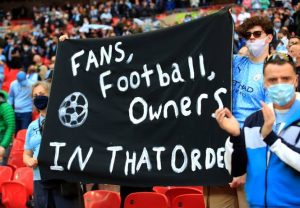The European Court of Justice have passed a ruling on the belated European Super League - a planned breakaway club competition in Europe.
The Luxumberg-based European Judiciary ruled that UEFA and FIFA acted against competition law by blocking the formation of the Super League in 2021.

The judgement has removed the legal barrier that would have stalled the formation of the European Super League, and is a big win for the likes of Real Madrid President Florentino Perez, and other top football chiefs in Europe who have been the ardent advocates for the football project.
FIFA and UEFA have been particularly opposed to the formation of the European Super League as it would challenge their monopoly to organize club competitions.
Also, domestic football administrators in UEFA and FIFA associations have been virulently opposed to the European Super League as it will likely deform the relevance of domestic league competitions and undermine the role of smaller clubs.
There have been massive protests by football fans against the European Super League due to notions that club owners are pushing the beleaguered football project to enrich themselves to the detriment of smaller clubs.
One of the main arguments put forward by the proponents of the European Super League is the need to increase the revenue base for the clubs.
However, it is understood the football scheme will be limited to selected big football clubs in Europe, excluding the smaller teams.
Before today's ruling by the European Court of Justice, there were reports of underground moves by opponents of the competition to get UEFA clubs to sign a binding agreement that they will still take part in European club competitions despite the formation of the European Super League.
As things stand, it is still unclear how football stakeholders in Europe will react to the ruling but the European Super League has now crossed it's first hurdle (legal barrier). Following the ruling, proponents of the competition are likely expected to swiftly set up logistics to bring the competition to life.
The Luxumberg-based European Judiciary ruled that UEFA and FIFA acted against competition law by blocking the formation of the Super League in 2021.

The judgement has removed the legal barrier that would have stalled the formation of the European Super League, and is a big win for the likes of Real Madrid President Florentino Perez, and other top football chiefs in Europe who have been the ardent advocates for the football project.
FIFA and UEFA have been particularly opposed to the formation of the European Super League as it would challenge their monopoly to organize club competitions.
Also, domestic football administrators in UEFA and FIFA associations have been virulently opposed to the European Super League as it will likely deform the relevance of domestic league competitions and undermine the role of smaller clubs.
There have been massive protests by football fans against the European Super League due to notions that club owners are pushing the beleaguered football project to enrich themselves to the detriment of smaller clubs.
One of the main arguments put forward by the proponents of the European Super League is the need to increase the revenue base for the clubs.
However, it is understood the football scheme will be limited to selected big football clubs in Europe, excluding the smaller teams.
Before today's ruling by the European Court of Justice, there were reports of underground moves by opponents of the competition to get UEFA clubs to sign a binding agreement that they will still take part in European club competitions despite the formation of the European Super League.
As things stand, it is still unclear how football stakeholders in Europe will react to the ruling but the European Super League has now crossed it's first hurdle (legal barrier). Following the ruling, proponents of the competition are likely expected to swiftly set up logistics to bring the competition to life.
